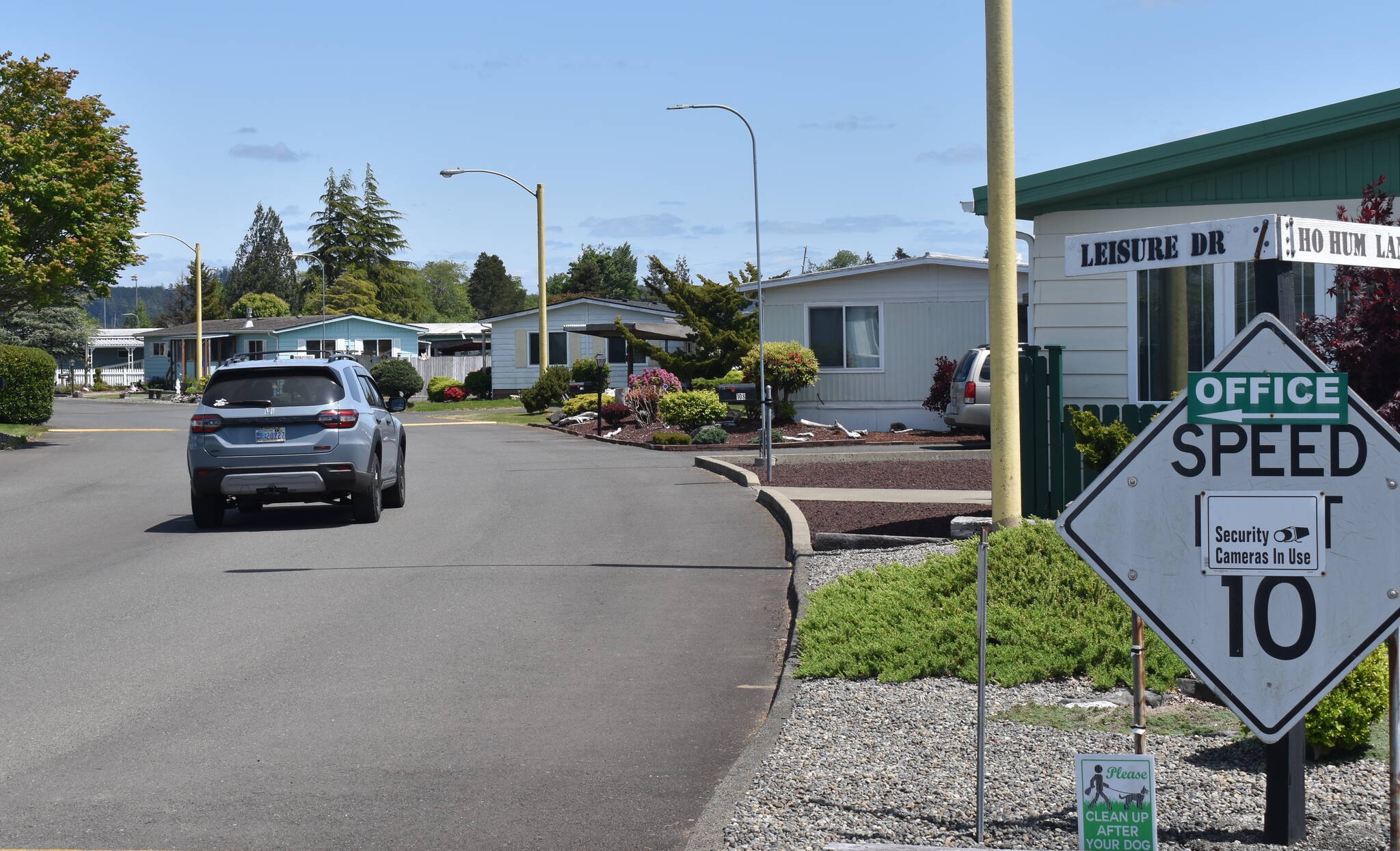As residents of a mobile home park in South Aberdeen continue to push for regulation of rising rents, the Aberdeen City Council last week considered an ordinance that would extend the notification period for rent increases.
As it reads now, though, the ordinance — which would require a six-month advance notification for rent increases greater than 5% in mobile home parks — could be dipping into areas of landlord and tenant protections already regulated by the state, potentially setting the city up for litigation, according to the city’s legal counsel.
That prospect caused the city council to table the ordinance in search of a more solid legal foundation, leaving park tenants “frustrated” and fearing displacement should their rents continue to rise.
Since their rent was raised last year from $485 to $635 per month — a 37% increase — residents of the Leisure Manor Mobile Home Park in South Aberdeen have sought protections against further hikes. They formed the Leisure Manor Tenants Association, which consists of about one-third of the parks’ residents.
Leisure Manor is a 55-and-older mobile home park, where, like other parks, tenants own their homes but lease the land below them. Many are on fixed incomes, and their homes, despite the name, are either too expensive or impossible to move.
“You need to have time to pack your things, make arrangements and figure out where you are going to go,” said Leisure Manor Tenants Association President Deb Wilson last month. “If it’s gonna be on the street, you’d better prepare tents and tarps and whatever you need. There’s no place to move, there’s no low income areas, there’s no place to take your trailer. We’re just stuck.”
With 191 spaces, Leisure Manor is the largest mobile home park in Grays Harbor County. The park is owned by Hurst and Son LCC, a Port Orchard-based company that owns a total of 64 manufactured home parks in the greater Washington and Idaho areas, including in Westport and Raymond. The company bought Leisure Manor in November 2021 for $11 million and raised rents a few months later.
Several members of the tenant’s association testified at the state Legislature in Olympia earlier this year, advocating for a pair of laws that would’ve limited yearly rent increases to 3% or the rate of inflation, whichever was greater. Those bills ultimately died before reaching the House floor for a vote.
But the tenants continued to work with AMHO — the Washington Association of Manufactured Homeowners, a group of legal experts that represent the rights of people in mobile home parks.
Then, in March, Leisure Manor tenants made public comments at a city council meeting, requesting the city impose extended notification periods for rent increases, not just for mobile home parks, but for all renters.
A month later, the group organized a meeting at its community “clubhouse” at Leisure Manor. In attendance were Ward 1 city council members Kaci Ann Morrison and Melvin Taylor, AMHO President Anne Sadler, a representative from Hurst and Son, and a few dozen Leisure Manor residents. The tenants association presented a list of proposed new agreements for the park, one being a 180-day — or six-month — notification requirement for increases greater than 5%.
The tenants gave Hurst and Son a June 1 deadline to respond to the new agreement, but had not heard back as of Tuesday morning, according to Caroline Hardy of the tenant’s association.
Hurst and Son declined to comment for this story.
At a meeting last week, the city council discussed an ordinance that resembled the demands made to Hurst by the tenant’s association. Council member Joshua Francey asked if the ordinance could be expanded to all renters, but that, along with the original ordinance, drew caution from the city’s legal counsel, Hillary Evans.
Two state laws already regulate the relationship between tenants and landlords — the Residential Landlord Tenant Act and the Manufactured/Mobile Home Landlord-Tenant Act. The former requires a 60-day notification period for renters, while the latter requires a 90-day notification period for mobile home owners.
Because state law trumps that of local jurisdictions, Evans said, enacting a 180-day notification period — twice the length set by the state — could subject the city to a lawsuit.
“To make our law more restrictive would, in theory, invite a challenge,” Evans said.
Evans said landlord groups could, at the least, file an injunction to block the rule, costing the city legal fees; at most, they could seek greater compensation for financial damage.
But that doesn’t mean the state’s landlord-tenant act is untouchable. Evans said other cities have “tiptoed” around state regulations: Bellingham enacted an ordinance earlier this year requiring a 120-day notice of rent increase — of any amount — for all renters, while Kenmore in 2022 enacted an ordinance ensuring tenants receiving a 10% or greater increase will be notified 180 days in advance, and 120 days for a 3% increase.
On Thursday, city officials, Leisure Manor tenants, AMHO representatives and attorneys from Aberdeen and Kenmore will meet to discuss the issue. Members of the tenants’ association hope the meeting will result in a legally sound ordinance that extends rent notification periods, fearing their rents will again increase next January, in seven months.
“There’s been a lot of stress brought about by the increases that took place last year, and if there’s an additional one coming next year, that may put some of us past the breaking point,” Hardy said. “We’re going to have to decide: can we still afford our medicines, can we still afford our doctor’s visits, can we still afford our groceries?”
Contact reporter Clayton Franke at 406-552-3917 or clayton.franke@thedailyworld.com.


